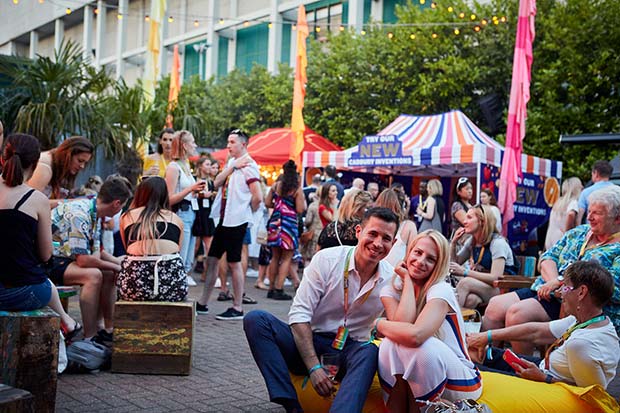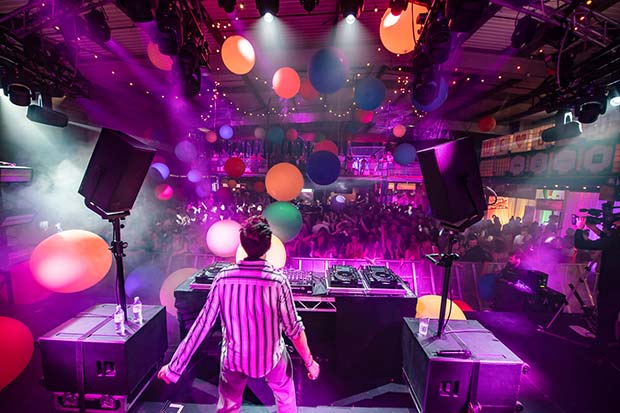After last year’s incredible launch event, GroceryAid’s Barcode Festival 2019 returned in early July to its trendy urban setting, Hawker House London. Over 2,200 industry colleagues came together to enjoy a full festival experience with amazing headliners, food and drink and the chance to dance, celebrate and network while, most importantly, raising funds for colleagues in distress. Mandi Leonard, GroceryAid’s Welfare Director and Steve Barnes, GroceryAid’s Chief Executive spoke to Glen Izzard at the Barcode Festival about what this event means to the charity and outlined their plans for 2020.
 How much money do you expect Barcode to raise this year?
How much money do you expect Barcode to raise this year?
Steve Barnes: We’ve got a very good idea of the final sum. At most GroceryAid events colleagues attend, they’re asked to do some fundraising on the night. Barcode is different: it’s an all-inclusive event, no raffles, no auctions, no speeches. We expect to make £450,000, which is a fantastic figure, enabling us to support hundreds of colleagues who have served our industry so well and now need our support and help. It’s an impressive sum, significantly up on last year, and the festival will continue to grow.
What was the total last year? Steve Barnes: It was just over £250,000. Who are the major supporters of Barcode? Any particular brands, retailers or wholesalers?
Steve Barnes: That’s an impossible question – if I try to name our major supporters, I’ll get reprimanded for not mentioning all of them! We’ve got 48 sponsors today and a great example is Marks & Spencer who have used this event as a reward and recognition programme for their food team and taken 300 tickets. It’s an egalitarian and democratic way to reward and recognise anyone who does a fantastic job in any facet of their business, be it on the checkout, in the warehouse, stocking shelves, in head office, the depots or driving. It’s an event where everyone gets treated the same, we’re all one grocery community, raising money for a fantastic cause to help colleagues in need in all walks of our industry.
I’m hugely proud that this Festival brings together every job in our industry. I don’t think it happens anywhere else. I think that’s very special and appealing, and we want the whole industry to come. Last year was fantastic and very hard to top. This year will be at least as good, if not better, and we’ve got great plans for 2020. We had a lot of learnings from last year as it was the first time we had run anything of this magnitude.
You sold out way ahead of the day. What was that like to deal with?
Steve Barnes: Yes, we sold out well in advance. There was a long waiting list and we got quite a lot of pressure the week before the event, from companies wanting more tickets. We’re very proud of the event overall, plus the age profile and the gender mix, and the fact that delighted colleagues from all areas of the industry are here – independent retailers, multiple retailers, wholesalers, suppliers, service providers, all coming together to have a good time.
Grocery Aid is doing more to help more people. Your recent press release says the total numbers helped rose 8% last year, crisis grants rose 40% and helpline calls rose 10%. Is there a crisis as such in the food and drink industry, or are these numbers going up because these people are now aware of you being there to help?
Steve Barnes: It’s the latter. We can’t lose sight of the fact this is a very big industry and employs over three million people. It’s a very complex industry and a tough, competitive one, where companies scrap for every fraction of margin. While we can all come together like this for a Festival to have a good time and be one community, the reality is that when people go back to their jobs, they’re competing hard in a tough market. So, the rise in the numbers you’re helping isn’t a sign of a seismic shift? Steve Barnes: No, I don’t think it is. This industry delivers high quality products at incredibly low prices to customers throughout the country every single day, and that makes it inevitably an industry where not everybody is going to earn as much as those at the top. I don’t think the growth reflects any great shift in need, it’s us raising awareness in a greater proportion of the industry.
If you loop back to the example with M&S, when you run a competition and the prize is tickets for Barcode – which has been received remarkably well – suddenly colleagues in M&S are aware of us. We’ve seen an increase in requests for support from M&S colleagues, which is exactly what we want, by the way. We’re really proud of that initiative and expect to run similar projects with other organisations next year.
 The press release about your Impact Report said the number of colleagues of working age needing your help has gone up significantly. What sort of help do you give them?
The press release about your Impact Report said the number of colleagues of working age needing your help has gone up significantly. What sort of help do you give them?
Steve Barnes: Any sort of help… It can be our helpline, which is free to grocery colleagues and their family members. We don’t charge companies for putting in what is effectively our white label employee assistance programme.
We’ve also had a big increase in crisis grants. It’s very easy for people starting in our industry to be knocked off course financially if they’re off work for a few weeks and go onto SSP. When that happens, there’s the possibility of them going to payday lenders, or even worse, doorstep lenders and getting deeper into debt.
We are a benevolent fund that is unique. We do not put charges against assets, we don’t do loans. We don’t expect money back. I don’t want grocery colleagues who are really struggling to take out loans at extortionate interest rates, when we’re here to help, so I’m proud we’re taking steps and raising awareness.
We’re not there yet, though. We’ve got loads more to do, we know that, but part of the growth you’re seeing is from the success of our awareness-raising. Where we are seeing a shift is to supporting more colleagues of working age versus retired colleagues as our need to help pensioners isn’t as acute as it once was. Now it’s important to support colleagues of working age.
Helping employees with their mental health is now very much a ‘thing’ in the grocery industry with, for example, Pladis promoting their involvement with Mind in their consumer advertising. How big a problem is workrelated stress in this business?
Mandi Leonard: We work very closely with industry. We have a Welfare Strategy Group, made up of senior HR directors. Last year we went to them and asked, what’s the biggest issue you’re seeing coming through? In common with many other industries, so it’s not unique to grocery, it’s mental health and wellbeing. This is partly because we’re getting better at talking about mental health and people are more willing to talk about their issues. In response, we launched a new health and wellbeing portal on our website to support grocery colleagues looking for support.
The idea is that people can go in at a low level of intervention. You don’t have to pick up a phone and call us, you just go onto the website and have access to sessions on a range of topics including stress, anxiety and depression, keeping healthy and keeping well and addiction problems, all of which can obviously have a huge impact on mental health. The support can be accessed quickly and easily in complete confidence.




Comments are closed.